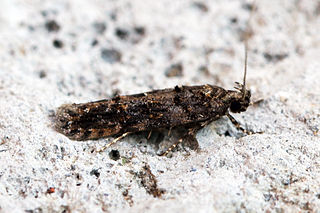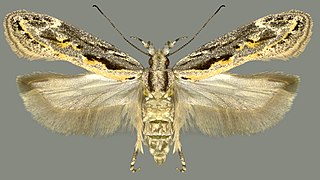
The wagtails, longclaws, and pipits are a family, Motacillidae, of small passerine birds with medium to long tails. Around 70 species occur in five genera. The longclaws are entirely restricted to the Afrotropics, and the wagtails are predominantly found in Europe, Africa, and Asia, with two species migrating and breeding in Alaska. The pipits have the most cosmopolitan distribution, being found mostly in the Old World, but occurring also in the Americas and oceanic islands such as New Zealand and the Falklands. Two African species, the yellow-breasted pipit and Sharpe's longclaw, are sometimes placed in a separate seventh genus, Hemimacronyx, which is closely related to the longclaws.

The black rosy finch or black rosy-finch is a species of passerine bird in the family Fringillidae native to alpine areas above treeline, of the western United States. It is the most range-restricted member of its genus, and a popular photography subject for birdwatchers.

The tawny-flanked prinia is a small passerine bird belonging to the genus Prinia in the family Cisticolidae, a family of Old World warblers. It is widespread and common in most parts of Africa south of the Sahara. The plain prinia of southern Asia was formerly included in this species but is now usually considered to be a separate species.

The plain-backed pipit or plain pipit is a medium-sized passerine bird which is a resident breeder in Africa south of the Sahara Desert.

The Asian crimson-winged finch is a pale-colored thickset finch with a heavy, dull yellowish bill. It is found from Turkey to NE Pakistan. The African crimson-winged finch was formerly considered conspecific and together known as the crimson-winged finch. It has an average length of 13 centimetres (5.1 in) and a wingspan of ca. 32 centimetres (13 in). It is light brown overall, with a whitish mid-belly, a black cap and a pinkish pattern on the wings and tail. The female is slightly duller than the male.

The tawny frogmouth is a species of frogmouth native to the Australian mainland and Tasmania and found throughout. It is a big-headed, stocky bird often mistaken for an owl due to its nocturnal habits and similar colouring.

The rosy bee-eater is a species of bird in the family Meropidae. It is found in Angola, Benin, Burkina Faso, Republic of the Congo, Democratic Republic of the Congo, Ivory Coast, Equatorial Guinea, Gabon, Ghana, Nigeria, and Togo.

Teleiopsis is a genus of moths of the family Gelechiidae.

The tawny owl, also called the brown owl, is commonly found in woodlands across Europe to western Siberia, and has seven recognized subspecies. It is a stocky, medium-sized owl, whose underparts are pale with dark streaks, and whose upper body may be either brown or grey. The tawny owl typically makes its nest in a tree hole where it can protect its eggs and young against potential predators. It is non-migratory and highly territorial: as a result, when young birds grow up and leave the parental nest, if they cannot find a vacant territory to claim as their own, they will often starve.

Teleiopsis diffinis is a moth of the family Gelechiidae. It is found in Europe, North Africa, the Near East, central Asia and Siberia (Transbaikalia).

The African crimson-winged finch is a pale-colored thickset finch with a heavy, dull yellowish bill. It is found in the Atlas Mountains of Morocco and Algeria. It was formerly considered a subspecies of the Asian crimson-winged finch. It has an average length of 13 cm (5.1 in) and a wingspan of ca. 32 cm (13 in). It is light brown overall, with a whitish mid-belly, a black cap and a pinkish pattern on the wings and tail. The female is slightly duller than the male.

Mesoligia literosa, the rosy minor, is a moth of the family Noctuidae. The species was first described by Adrian Hardy Haworth in 1809. It is found throughout Europe, North Africa and western Asia. and east across the Palearctic to Siberia.

Ornativalva plutelliformis is a moth of the family Gelechiidae. It was described by Staudinger in 1859. It is found from southern Europe and North Africa east to western Asia and China (Xinjiang).

Hibrildes crawshayi is a moth in the family Eupterotidae. It was described by Arthur Gardiner Butler in 1896. It is found in the Democratic Republic of the Congo (Katanga), Malawi, South Africa, Tanzania, Zambia and Zimbabwe.
Aristotelia howardi is a moth of the family Gelechiidae. It was described by Walsingham in 1909. It is found in Mexico (Sonora) and California.
Gonionota cologramma is a moth in the family Depressariidae. It was described by John Frederick Gates Clarke in 1971. It is found in Venezuela.
Stenoma ferrocanella is a moth in the family Depressariidae. It was described by Francis Walker in 1864. It is found in Panama and Brazil (Amazonas).

Scooby-Doo! Shaggy's Showdown is a 2017 direct-to-DVD animated western comedy mystery film, and the twenty-eighth entry in the direct-to-video series of Scooby-Doo films. It was released digitally on January 31, 2017, and on DVD on February 14, 2017.















